Search the Special Collections and Archives Portal
Search Results
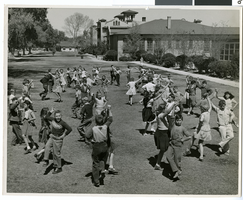
Photograph of school children dancing, Las Vegas (Nev.), late 1930s
Date
1936 to 1939
Archival Collection
Description
School children dancing on the lawn at Las Vegas [Grammar] School, 4th and Bridger Streets. Site Name: Las Vegas Grammar School (Las Vegas, Nev.) Street Address: 401 South Las Vegas Boulevard
Image
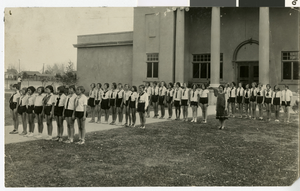
Photograph of school girls during physical education class, Las Vegas (Nev.), late 1920s
Date
1927 to 1929
Archival Collection
Description
School girls lined up in rows during a physical education class at Las Vegas High School. Site Name: Las Vegas High School (Las Vegas, Nev.)
Image
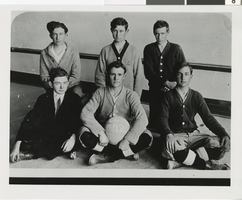
Photograph of Clark Sounty High School basketball team, Las Vegas (Nev.), 1912
Date
1912
Archival Collection
Description
Group photo of unidentified members of the Clark County High School basketball team posing with a basketball. Written on the ball is "CCH '12." Site Name: Las Vegas High School (Las Vegas, Nev.)
Image

Photograph of Overland Hotel, Las Vegas (Nev.), 1920
Date
1920
Archival Collection
Description
Black and white photograph of the Overland Hotel at Main and Fremont Street. The signs on the hotel read: "Hotel Overland," "1912 New Overland Hotel Big Free Sample Room," "Cold Beer on draft," ...Whiskey..." (illegible), and "Bonded Goods." Site Name: Overland Hotel (Las Vegas, Nev.); Fremont Street (Las Vegas, Nev.) Street Address: Main Street and Fremont Street
Image
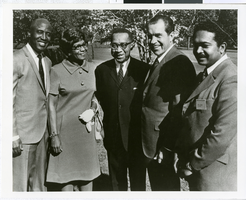
Photograph of Woodrow Wilson, President Nixon and others at the Institute for Black Elected Officials, September 11, 1969
Date
1969-09-11
Archival Collection
Description
Woodrow Wilson, President Nixon and unidentified persons posing at the Institute for Black Elected Officials.
Image
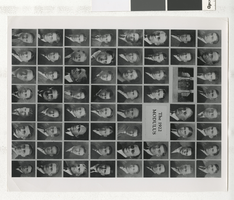
Yearbook page from Rose Polytechnical Institute, Terre Haute (Ind.), 1922
Date
1922
Archival Collection
Description
Yearbook page from Rose Polytechnical Institute in Terre Haute, Indiana. The Rose Polytechnical Institute later changed names and is now known as the Rose-Hulman Institute of Technology. C.D. Baker is first person in fourth row. The description in the yearbook reads, "The 1922 Modulus." Site Name: Rose-Hulman Institute of Technology (Terre Haute, Ind.)
Image
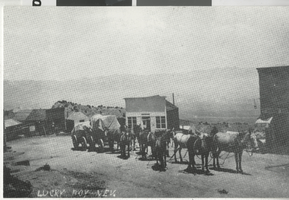
Postcard of Lucky Boy (Nev.), 1909
Date
1909
Archival Collection
Description
The town of Lucky Boy was born as a result of the discovery of lead-silver ore in the vicinity in 1906. The camp experienced a boom in 1908 when exploration opened a number of rich veins in the district. Lucky Boy's population peaked in the 1910 at over 800, then declined rapidly as the high grade was mined out. The mines produced ore on a small scale through the 1950s.
Image
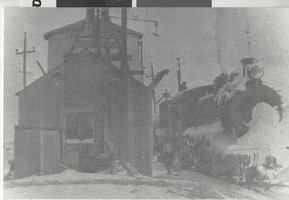
Postcard of a Tonopah and Goldfield Railroad train, Millers (Nev.), 1933
Date
1933
Archival Collection
Description
A Tonopah and Goldfield Railroad train takes on water and fuel at Millers, NV, winter, 1933. "The winter of '33 was one of the most severe recorded in central Nevada up to that time. Snow isolated many outlying communities for weeks at a time and temperatures dropped to the -30s. On a number of occasions the trains were marooned in the snow drifts between Millers, Tonopah and Goldfield and had to be dug out by hand."
Image
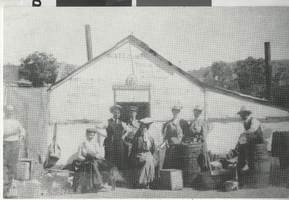
Postcard of a tent store, Montezuma (Nev.), 1908
Date
1908
Archival Collection
Description
Montezuma was the site of extensive mining activity from the 1860s-1880s but was dormant in the early 1900s when the Goldfield strike was made. According to the information painted on the front of the "Road House" of the "Montezuma Trading Company", the traveler or prospector could purchase "Wines & Liquors, Tobacco, Miners Supplies, Hay & Grain, and Groceries" at the store. Montezuma was located in the Montezuma Mountains seven miles west of Goldfield and was experiencing a resurgence precipitated by the discoveries at Goldfield.
Image
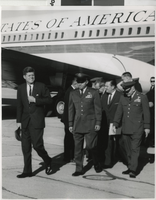
Photograph of President John F. Kennedy and Nevada Senator Howard Cannon, early 1960s
Date
1960 to 1963
Archival Collection
Description
An image of John F. Kennedy (far left) in front of Air Force One with Nevada Senator Howard Cannon (3rd from left).
Image
Pagination
Refine my results
Content Type
Creator or Contributor
Subject
Archival Collection
Digital Project
Resource Type
Year
Material Type
Place
Language
Records Classification
